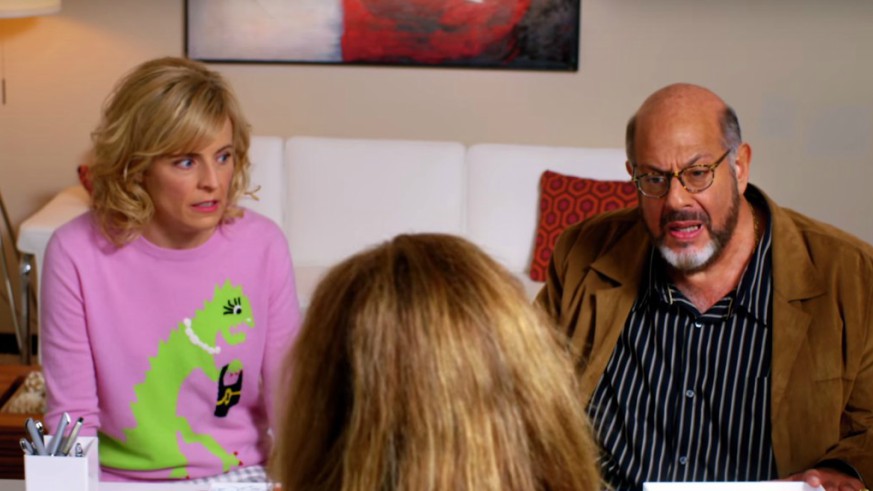We currently live in an age of hyperbole, where the word genius is dished out with a frustrating flippancy that has basically rendered its meaning mute. With that in mind, it would feel wrong of me to label Fred Melamed’s performance on “Lady Dynamite” as such. It might even suggest that some kind of unnatural force is responsible for making every line he utters instantly hilarious, instead of his hard graft and the innate comedic timing that he has built up over decades.
What I am comfortable with saying, though, is that, thanks to his performances as Bruce Ben-Bacharach on “Lady Dynamite,” Fred Melamed is hands-down the funniest person on television. That’s something that continues afoot in its second season, as Melamed’s gregarious personality meshes perfectly with the heightened character to create a mesmeric comedic creation.
But, for Melamed, “Lady Dynamite’s” lead actress and inspiration Maria Bamford is the person responsible for making the show shine and stand-out. During our recent discussion about the return of “Lady Dynamite” the 61-year-old actor admitted this was something he noticed from the very first time he saw Bamford perform stand-up.
“Usually comedians manufacture a character that is a trade of who they are. But with Maria it is actually her, and her life as she sees it,” Melamed explained, before recalling, “I was extremely enamored with the strange combination of things that she is.”
“Everyone is aware of her honesty, from her struggles with mental illness to how she navigates the world. She is also brilliant. And you couldn’t have one without the other. Her sense of humor is extremely, extremely sharp. I put her in the same class with the greatest comedians of all time, Richard Pryor and all that, who use their vulnerability as people honestly.”
Melamed and Bamford actually first became friends after working together on the short-lived “Benched” together, during which time Melamed offered Bamford a piece of advice that allowed their friendship to become even tighter.
“Maria is insecure as an actress. But she feels very comfortable as a stand-up, which to me sounds terrifying, as she is very in control in that situation. But playing characters she felt rather insecure, even though they are surprising and great. I said to her, ‘To me it is all just one thing. The characters that you do in your stand-up are just like characters you are acting, except you have to respond to other people.’ Maria felt relieved to hear it that way, and we got to become close, good friends.”
When Mitch Hurwitz and Pam Brady decided to create a sitcom based on Maria Bamford’s life, the actress instantly insisted that Fred Melamed was the perfect choice to play her manager, and the trio were in such agreement that no-one else was even considered. It didn’t take long for Melamed to agree to the offer, especially because the show managed to combine all of the elements that made Bamford’s stand-up so distinctive.
“She is a remarkable person, a deeply unusual person. Through all her travails, both with mental illness and the stuff that comes with just being a person today, especially one with her personality, she maintains this Midwestern positivity, which really affects the tone of the show, and makes it refreshing and enjoyable. It is a real reflection of her.”
“We don’t shy away from cynicism, dark things. ‘Lady Dynamite’ is often about how dark Hollywood is and how much a pain in the ass and crazy everything is. But Maria and the show maintain a love for life and people. Which doesn’t soften anything, but makes it unusual for a comedy. And that darkness reflects my taste, especially when it has a tender, beating heart that makes it life-giving.”
You’ll be able to taste just that when the second season of “Lady Dynamite” premieres on Netflix on Friday November 17, while you can read the rest of my interview with the absolutely incredible Fred Melamed, where he goes deeper into the second season and Netflix, below.
What can you tell us about Lady Dynamite’s second season?
“The first season followed what happened in Maria’s life, where she had this breakdown, and it was tough for her to comeback. But she did, she came to California and got her career again, and developed friendships and relationships, but it was tough going. So in the second season she gets a television show, she winds up meeting someone and getting married, and it is a happy marriage, but there are lots of compromises and twists which need to be worked out, like any marriage. She deals in a sense with all the things she wanted, but you have to be careful what you wish for, and then seeing how she negotiates with them. That’s the tone of the second season, it actually follows that into some interesting and unexpected places.”
“I mean, the first season got to be very tough for Maria. Because she is in every episode, practically in every scene, and she also has a stand-up career, and she has to take medication that makes her more tired. When you work in television it is 14 hour long days. At one point she said, ‘I wish someone else could do an episode and could stand in for me.’ So in the second season someone does that, we have a Bizarro episode and world, where people act really strangely and do things we are very surprised to see them do, which leads to more confrontational stuff.”
How did you join ‘Lady Dynamite’?
“I had been friends with Maria for a while. I was a fan, but we worked together on a show. I am friends with Patton Oswalt, and I saw him at an awards thing in New York, and he said, ‘Do you know Maria?’ I said, ‘No.’ He said, ‘You should she’s great.’ I just looked at her stuff on YouTube, and I thought she was a genius. I didn’t know her, though. But when I moved to LA from New York I got on this television show [Benched] and it turned out that Maria was also on the show, so we got to be friends. ‘Benched’ got cancelled, so I didn’t see her for a while.”
“Then I got a call from ‘Arrested Development’s’ Mitch Hurwitz to say that Maria wanted to see me about a show, and I just assumed that it was to audition. The day of the audition I was struck down with a stomach flu, though, and I couldn’t go in. I just assumed they would find someone else immediately and I would be forgotten, because that is how this town works. But a week later I was asked to come back, and it was just Mitch, Maria, and executive producer/showrunner Pam Brady, and they said, ‘Netflix has greenlit 13 episodes, it has gone to series already, and we want you to play Maria’s manager Bruce. We’re not seeing anyone else.’ It was unbelievably wonderful. It never happens like that. Usually they want to test you. But the streamer model is different to the regular network model.”
Talk about the difference between working with Netflix and a network?
“There aren’t as many notes, because everyone in network keeps their jobs by giving notes. But Netflix make a deal to give authority to a maverick, and in this case it was Mitch Hurwitz. And then you don’t get a lot of rethinking, especially compared to a network schematic. So for good or ill you do get something very close to what the originators intended on the show. Mitch and Pam stick to really what Maria is and her view of the world, even though Maria doesn’t write the show.”
Do you think this is the golden age of television?
“Netflix has changed the game, and it creates shows that people haven’t really seen. People used to say that about every show that came along, but now it is true, and it is possible to do things that are new. I do think that there will be more opportunity for voices that are unusual. Every logline in Hollywood used to be, ‘’Friends’ meets this.’ It would be a familiar trope meeting a new familiar trope. But the success of people doing stuff genuinely new has encouraged people. I think there will be a winnowing. The numbers of new productions is so high, I don’t think all will last. Only the best and most popular will survive. But networks now make more money from their streaming service than licensing it out to cable. Whether that will change things artistically remains to be seen, but there is now a much more direct path to the audience.”



















